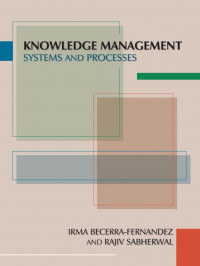
Computer File
Knowledge Management: Systems and Processes
"Knowledge Management: Systems and Processes" is for students and managers who seek detailed insights into contemporary knowledge management (KM). It explains the concepts, theories, and technologies that provide the foundation for KM; the systems and structures that constitute KM solutions; and the processes for developing, deploying, and evaluating these KM solutions. We hope this book will help readers acquire the relevant suite of managerial, technical, and theoretical skills for managing knowledge in the modern business environment.
The purpose of this book is to provide a thorough and informative perspective on the emergent practices in knowledge management. Information technology has been, and will continue to be, an important catalyst of this innovative field. Web-based technologies including Web 2.0, artificial intelligence, expert systems, analytics, and collaborative technologies continue to support and transform the field of KM. However, these technologies would not be effective without the day-to-day social aspects of organizations such as “water-cooler conversations,” brainstorming retreats, and communities of practice. To further complicate matters, the current business environment renders new skills obsolete in years or even months.
Knowledge management is defined in this book as doing what is needed to get the most out of knowledge resources. KM is an increasingly important discipline that promotes the discovery, capture, sharing, and application of the firm’s knowledge. Indeed, we are witnessing a new era with advanced industrial economies being revolutionized with the advent of the knowledge age and highly skilled knowledge-based workers replacing industrial workers as the dominant labor group. Although the benefits of KM may be obvious, it may not necessarily be so obvious to know how to effectively manage this valuable resource. In this book, the discussion of KM reflects the intimacy the authors have with this topic from a theoretical as well as a practical standpoint and through their substantial and diverse experiences.
The book is divided into three parts: Part I, Principles of Knowledge Management—This part provides a more detailed discussion of the concepts of knowledge and knowledge management and describes the key constituents of KM solutions including infrastructure, processes, systems, tools, and technologies. Part II, Knowledge Management Technologies and Systems—This section is devoted to a discussion of the underlying technologies that enable KM systems associated with the four types of KM processes. Part III, Management and the Future of Knowledge Management—Some of the issues related to management practices and the future of knowledge management are presented here.
Ketersediaan
| E00017 | 658.4038 BEC k | My Library | Tersedia |
Informasi Detail
- Judul Seri
-
-
- No. Panggil
-
658.4038 BEC k
- Penerbit
- New York : M.E. Sharpe., 2010
- Deskripsi Fisik
-
xvi, 352 pages : illustration , cm.
- Bahasa
-
English
- ISBN/ISSN
-
9780765623515
- Klasifikasi
-
658.4038
- Tipe Isi
-
text
- Tipe Media
-
computer
- Tipe Pembawa
-
other (computer)
- Edisi
-
-
- Subjek
- Info Detail Spesifik
-
-
- Pernyataan Tanggungjawab
-
-
Versi lain/terkait
Tidak tersedia versi lain
Komentar
Anda harus masuk sebelum memberikan komentar
 Karya Umum
Karya Umum  Filsafat
Filsafat  Agama
Agama  Ilmu-ilmu Sosial
Ilmu-ilmu Sosial  Bahasa
Bahasa  Ilmu-ilmu Murni
Ilmu-ilmu Murni  Ilmu-ilmu Terapan
Ilmu-ilmu Terapan  Kesenian, Hiburan, dan Olahraga
Kesenian, Hiburan, dan Olahraga  Kesusastraan
Kesusastraan  Geografi dan Sejarah
Geografi dan Sejarah  E-Book
E-Book